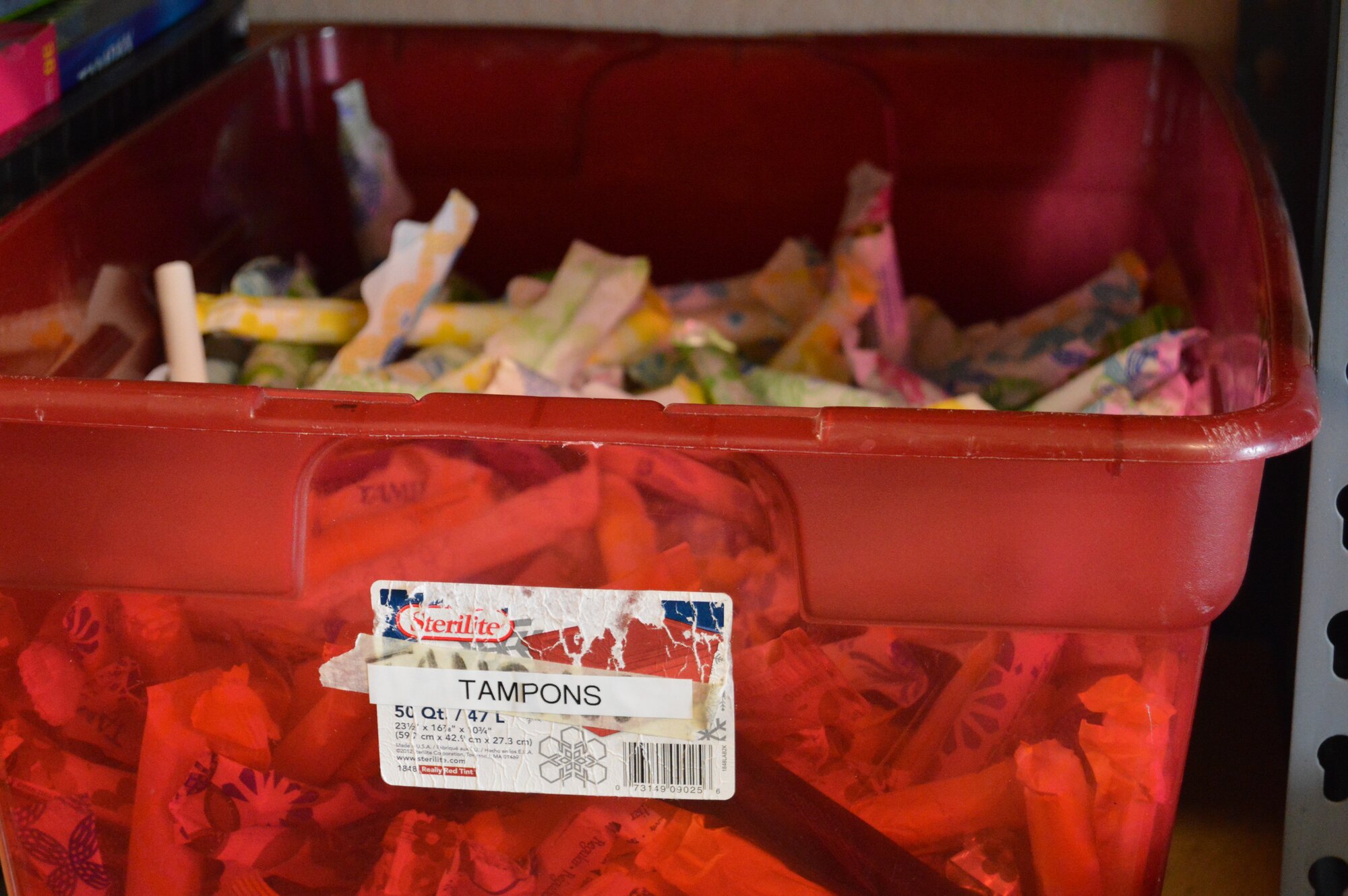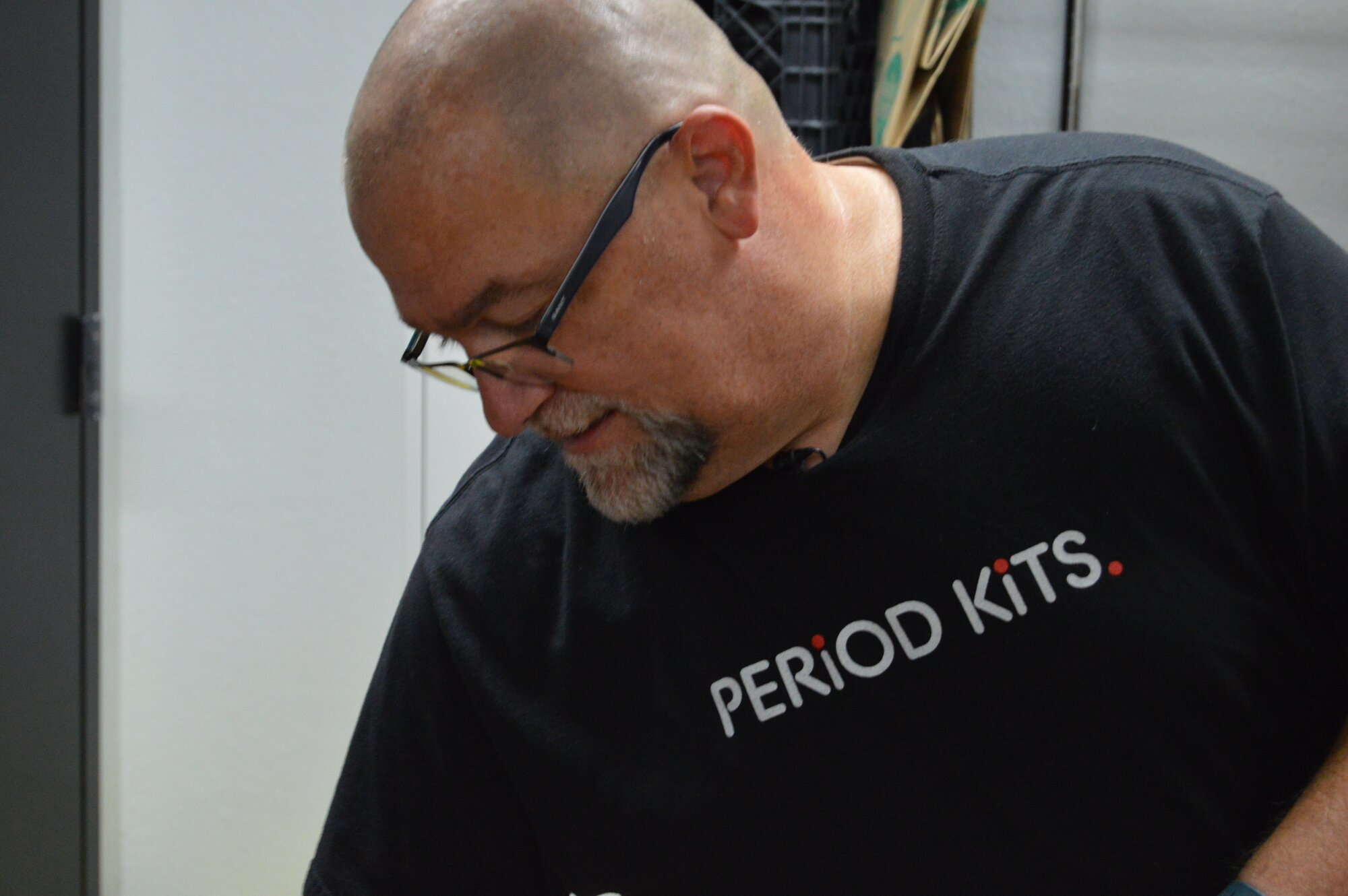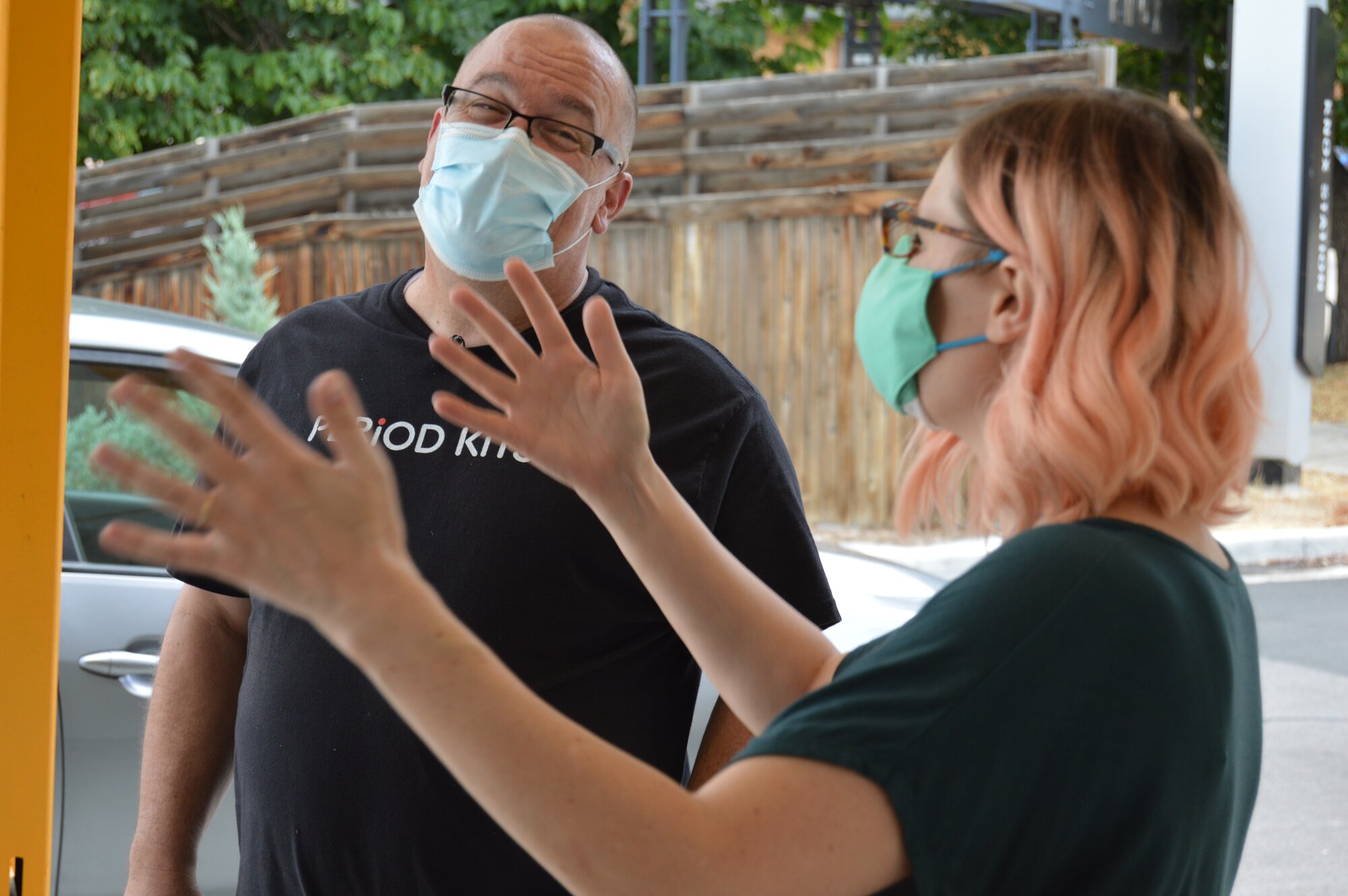Nearing one million products delivered, nonprofit tackles period poverty in Colorado

DENVER — Driving down the streets of downtown Denver is man in a small, silver Kia packed to the brim with thousands of period products. That man behind the wheel is used to this lifestyle, having spent the last two and a half years surrounded by tampons, pads, liners and women’s underwear.
“Coming from a man, I hope it does kind of just bring it back to it’s just a person,” said Geoff Davis, the founder of the Denver-based nonprofit Period Kits. “If you identify as a person and you need products, we’ve got products for you.”
Period Kits is just how it sounds: the nonprofit provides kits filled with items used during a menstrual cycle. Originally, a kit comprised of three months’ worth of products like tampons, pads, liners, underwear and personal wipes. The organization has spent the last few years handing them out to people experiencing homelessness or extreme poverty and to other nonprofits that serve similar communities.
This August, Period Kits is hitting a bit of a milestone. It has now been two years since it received its official 501(c)(3) nonprofit status, and it’s about to deliver its one millionth product. While happy he’s able to help, Davis struggles with the reality of the work he’s doing.
“It’s just unfortunate that I have to do this. At so many times over the last three years I’ve thought, ‘This is just dumb that I’m doing this,’” Davis explained. “It’s dumb that this is a need, I guess. It’s not dumb that I’m doing it, but it’s dumb that this is a need.”
He also wants the people of Colorado really to understand that Period Poverty is a big problem in the U.S. A study released in Obstetrics & Gynecology in 2019 found that nearly two-thirds of low-income women in a large U.S. city couldn’t afford menstrual hygiene products.
“[People] don’t want to look at this is an issue here in this country,” Davis said. He said Period Kits has received feedback that they should be sending supplies to developing countries. “But this is here, it’s our backyard. This is Brighton. This is Arvada and Highlands Ranch.”
So, on a hot Friday afternoon in August, Rocky Mountain PBS accompanied Davis as he completed a big part of Period Kits’ work. He dropped off supplies to three organizations—The Delores Project, Haven of Hope, and Bayaud Enterprises. Each place helps those who are unhoused or on a very restricted income in different ways.
Pulling up to the delivery zone outside each one of these locations, Davis is greeted with smiles and gratitude. He makes these kind of drops at least once a quarter, sometimes delivering thousands of tampons or pads at one time.
“The partnership is amazing,” said Stephanie Johnson-Wall, a volunteer program manager with The Delores Project. “[Davis] has been so wonderful and supportive of what we do here at The Delores Project."
Much of what these organizations do is beyond the basic physical needs, it's also emotional support to be able to provide these kits.
“So having this is just a very small way of restoring some dignity to them,” said Tawnya Trahan, the executive director of Haven of Hope. “All of our services is to serve without judgment. Not only bring them some hope, but to restore some dignity.”
Giving back some dignity is a strong message from each one of the people Rocky Mountain PBS spoke to about Period Kits. And it's part of the organization's slogan: At Period Kits it's about health & dignity. Period.
“The biggest thing for me was that this all comes down to a person’s dignity, right?” said Davis. “And no one should have to choose between food or tampons.”
That decision between buying food or hygiene products is a personal story Davis actually heard that truly resonated with him. He said the woman who experienced that heartbreaking decision chose to go hungry that day so she could buy tampons.
[Related: New Laws Aim To Prevent "Period Poverty"]
“Part of our conversation was: 'What if you’re just hungry that day? What do folks do if they choose the food? So, what are people using as alternatives?'” Davis asked of the woman. “And she said folks are using t-shirts and folks are using newspapers or folks are not using anything.”

That is a harsh reality that the organizations working with unhoused people often hear. These nonprofits say without Period Kits, they would not be able to provide—consistently or possibly hardly at all—feminine hygiene products for those in need.
“[Period products] are expensive and it kind of—managing a budget for a food pantry, which is fairly limited on a month-to-month basis—can eat up a fairly substantial amount of your dollars, which can be spent on food or other hygiene products,” explained MariSol Little with Bayaud Enterprises.
That’s the main of the reason Davis wants to focus solely on period products, so that other places can focus on their main mission.
“I wanted an agency that would focus on this. We’ll focus on period poverty, you spend your money on whatever your mission is...that was important for me,” said Davis.
Trahan with Haven of Hope highlights how important these kits are to the people they serve. What strikes her the hardest is the reaction from people when Haven of Hope doesn’t have any period products to hand out.
“They're angry, they're hurt. They are frustrated that they can't take care of themselves,” explains Trahan. “It adds just that much more tragedy to their everyday life if they can't take care of themselves.”
As Period Kits have grown during the last few years, it has been able to adapt to fit the needs. The organization started out with just a three-month kit, then received feedback that some people didn’t want to carry that much product around at once. Now, Period Kits makes mini versions with just a one-month supply. Other times they don’t deliver ready-made kits but just mass amounts of a certain product that an organization might be low on, like underwear or pads. Through it all, the mission stays the same.
“I’m sure they have a lot of stressors and a lot of other things going on, so for three months or six months or however long it is they don’t have to worry about that. And that’s kind of the whole point of this to alleviate the burden of somebody,” said Davis.
Seeing the relief on a person’s face when receiving these products when they’re in such desperate need is hard to describe. Little with Bayaud Enterprises likens it to being a type of Santa Claus.
“Women would open them, they'd find underwear, they'd find enough to kind of cover three months’ worth of period kits,” describes Little. “And it's just like ‘Oh my gosh.’ It was an absolute look of joy on their face.”
“It creates a connection between me and that guest like, 'I've got you,' you know?” said Trahan with Haven of Hope. “We're friends, you can count on me.”
Davis says handing out these kits can be emotional experience on both sides, as he remembers one powerful experience when he saw a woman with her family asking for money in downtown Denver.
“I pulled over and I jumped out, and I kind of said ‘I don’t know what’s going on, but this for you. It’s going to be a year’s worth of period supplies,’” recalled Davis. He gave the woman four of the three-month kits. “She took them and started hugging them to her chest and she started crying, and then I started crying…that’s how much impact this has to folks."

The waitlist for Period Kits is long; eight organizations are asking for help. But Period Kits isn’t able to provide for them yet. So, when asked about the future, Davis says this organization wants to focus on Colorado first.
“You talk to friends or people and they’re like ‘Oh my gosh you have a waitlist? That’s awesome!’ And I think in the nonprofit world, that’s not awesome. That’s bad,” said Davis. “This tells you this is a need that’s not being addressed.”
He hopes in 10 years, his nonprofit won’t exist anymore because the need has been taken care of.
“So, it’s really silly in one way that we have to do this because a period is a basic need,” explains Davis. “What I tell the board is we’re going up against 25 years of stigma. We’re fighting against that…where people don’t want to talk about periods, people don’t want to talk about the issues.”
[Related: For Years, Western Scientists Stigmatized Periods. We're Living the Consequences.]
That’s also part of the mission for Period Kits, to fight the stigma that this is an exclusively woman problem. The hope is that the whole community will be able to openly talk about menstruation without that feeling of shame or embarrassment.
“It’s a human being issue, right? And again, it’s a basic need that is not being addressed,” said Davis. “We don’t ever hear about toilet paper poverty, so it’s almost like we shouldn’t hear about period poverty. It’s a basic need.”
At the end of his Friday afternoon spent delivering those products, Davis plays Tetris inside his small Kia by wedging and squeezing boxes full of more period products to start organizing for the next round of deliveries.
“That’s kind of how it works: you fill up the car and then you go to a few places, take an empty car home until the next time,” said Davis.
There are multiple opportunities to become involved in the organization. You can donate products, money, or become a volunteer. All of that information is on the Period Kits website.
Jennifer Castor is the Executive Producer of Multimedia Content at Rocky Mountain PBS. You can reach her at jennifercastor@rmpbs.org
Amanda Horvath is a multimedia producer with Rocky Mountain PBS. You can reach her at amandahorvath@rmpbs.org.


